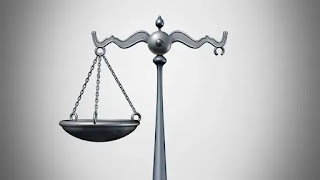The great chessed of Divine Judgment
In this world, a judge cannot truly do ‘true justice’, so that it does not punish innocent people, those who may be affected by it.
 |
| Screenshot |
In his introduction to shirat Ha’azinu - as our Parasha is called - Moshe Rabbeinu relates to Bnei Israel the greatness of Hashem, saying:(32:4)’The Rock - perfect is His work, for all His paths are justice; a G-d of faith without iniquity, righteous and fair is He.’
The Mussar masters bring a beautiful insight, on this passuk.
Rav Israel Salanter expounds:’In the ways of the world, when a person transgresses against the law of the land, and is brought before a judge, the judge judges him according to his actions, and imposes on him the punishment prescribed by the law of the land, for his offence.
If the sentence is a lengthy term of imprisonment, for instance, this punishment does not only affect him, but also the members of his family, and his circle of friends and acquaintances.
‘Imagine that he has elderly parents, and they plead with the judge to lessen the punishment, because he is their sole provider, pleading:’we are innocent, why do we have to suffer the shame of hunger, because of our son’s offence?
‘They are followed by the wife - and their young offspring - who, in tears, asks the judge:’how can i continue to exist, when my husband sits in prison?’. Is it not right that he be freed, for her sake and for the sake of their infant children?
Then his other relatives, and circle of friends, join in the plea, relating to the judge the damage they will suffer, if he is sent to prison.
‘But, with all the ‘justness’ of their pleas, it is not within the authority of the judge to change the verdict prescribed by the law of the land.
‘This is the defect in judgement in this world, that the judge cannot truly do ‘true justice’, so that it does not punish the innocent people, those who may be affected by it.
However, the justice of Hashen is different:it is ‘without iniquity’, because ‘perfect is His work’ - when He punishes someone for their transgression, he does it in a way that does not harm those who did not sin; and, if the result of punishing a transgressor, is that an innocent party would be harmed, Hashem foregoes the punishment, so as not to harm the innocent.’
Rav Chaim Snmulevitz adds:’We read (Ps 19:10) that, in addition to Heavenly punishment being exactly commensurate with the transgression - which is often not the case with judgement here - it has an additional virtue:’Hashem’s judgements are אמת צדקו יחדיו: true and righteous together’.
This means that, in human courts, the offender alone is judged, even where the result is that others also suffer, collaterally, like his family and friends, and it is not taken into account, that the punishment would also fall on them, despite they being blameless.
‘Not so Heavenly judgement, because it is ‘true and righteous together’, and everything is taken into account, and no-one is afflicted unless he merits it because of his own actions.
‘We learn from this that, if the wife and children of the offender have not, for their own actions, deserved any punishment, yet the punishment of the offender would cause them suffering,, the offender is spared.
‘This is the meaning of Hashem being ‘without iniquity’.’
Rav Elya Lopian, in his commentary on our passuk, first asks:’What praise of Hashem, is it to say that He is ‘without iniquity’? Were we to hear that someone is praise-worthy, Nbecause he is ‘without iniquity’, we wouldn’t be impressed by this ‘praise’!
‘The fact that a person does not harm another for no reason, is not a reason for praise; if so, why is this - in our passuk - said as praise of Hashem?’.
He answers, that we can understand this from the way in which Hashem judges offenders, as Rav Salanter taught.
He sweetens our understanding of this the chesed of Hashem, from the judgement of Rosh Hashanah:’Our Sages (Rosh Hashanah 18.) state that, on this Day, each individual is judged ‘like a sheep before their master’: כבני מרוו, and, adds Rabbi Yochanan, all are ‘surveyed as one’.
‘This is the chesed in Hashem’s judgement, is that, though each person is judged by himself, to be judged on his own merits, he is ALSO judged as part of the whole, meaning: the Heavenly judgement also takes into account who else would be affected, should the individual be punished, as his deeds merit - and if others who are blameless, would be harmed by his punishment, then he goes unpunished!’.
Rav Simcha Zissel of Kelm, the venerable ‘Alter’ of Kelm, has a beautiful thought on this:’Therefore a person should make every effort to have as many froends as he can, ,because they might save him from Heavenly punishment’, in the manner we have brought.
‘Therefore, the wise counsel is at all times - but especially on erev Rosh Hashanah - each one should bind himself with bonds of love, to all others, as this might ‘save’ him, from Divine punishment.’
A parting thought from Rav Yaakov Neiman, on the underlying meaning for each of us of the words:’without iniquity’:’True Emunah is that which says:’Hashem is ‘without iniquity’, even when, to our minds, it is possible to think that there is iniquity.
‘The principle of Emunah is to believe in Hashem, when it goes against our intellect; for this reason, the Akeida was the greatest test of Avraham Avinu, as it seemed to totally contradict Hashem’s promise ‘that in Yitzchak, shall be your seed’ - yet Avraham did not ask any questioned of Hashem, but did as commanded, trusting in Hashem with simple faith.’
http://www.israelnationalnews.com/news/377366
THIS IS A LESSON FOR THE ISRAELI SUPREME COURT, that fails in its mission, by deciding against The Righteous.

No comments:
Post a Comment